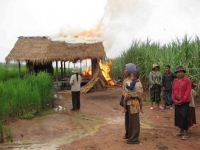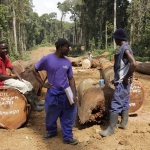Coca-Cola Ordered to Turn Over Documents Relating to Land Grabbing in Northern Cambodia

Farmhouse being torched during forced evictions in O’Bat Moan village, October 2009.
A court in Atlanta, Georgia, has ordered Coca-Cola to turn over documents relating to the violent eviction of hundreds of families in northern Cambodia in 2008 and 2009. The families were evicted to make way for sugar plantations planned by Mitr Phol, a Bangkok-based supplier to Coca-Cola.
In 2014, Coca-Cola conducted an investigation into the matter. Soon after the investigation was conducted, Mitr Phol pulled out of the plantation project. Activists believe that Coca-Cola’s findings, which have never been made public, could shed light on what happened at the time.
“Coca-Cola has information about Mitr Phol’s actions and the plaintiffs deserve the opportunity to review it,” Sarah Jaffe of Inclusive Development International, one of the organizations that petitioned the court, said in a press release. “The truth should not be allowed to collect dust in corporate file cabinets, especially when serious human rights abuses are at issue.”
One of the lead plaintiffs in the case is Hoy Mai, mother of eight from Bos village in Kaun Kriel community in Oddar Meanchey province of Cambodia, which lies just south of Thailand. Mai’s village was located inside a 20,000 hectare concession handed over by the Cambodian government as part of a 2008 deal with three executives of Mitr Phol, the fifth-largest sugar producer in the world. At the time, Mitr Phol claimed it would invest million of dollars in the Angkor Sugar project to grow and process sugar cane creating 5,000 new jobs.
Over the course of two years, some 2,000 families were evicted from 31 villages in the area. In April 2008, 154 homes in Bos/O’Bat Moan village in Kon Kriel commune were forcibly destroyed by Angkor Sugar staff. Another 100 were destroyed in October 2009, including that of Hoy Mai, by a contingent of some 150 military police officers and others, according to evidence gathered by Cambodian League for the Promotion and Defense of Human Rights (LICADHO).
In November 2013, Coca-Cola announced a zero-tolerance policy towards land grabbing and agreed to conduct third-party social, environmental and human rights assessments of its suppliers.
In February 2014, Coca-Cola sent an official delegation to investigate the allegations. “The team will meet with key stakeholders, including NGOs, to hear first-hand concerns of allegations of human rights violations, particularly with regard to land conflicts in the cane sugar industry,” Sharolyn Choy, Coca-Cola’s spokeswoman for the Pacific region, told the media at the time.
Fifteen months later, the Angkor Sugar concessions were canceled and Mitr Phol officially withdrew from the area. Very little sugarcane was planted in the area – instead Cambodian soldiers have been reported to be operating illegal timber export businesses to sell wood for railway construction in Thailand, according to local reports from Action Aid and Oxfam.
In 2015, a Thai National Human Rights Commission found Mitr Phol responsible for the violent evictions of the villagers and called on the company to compensate them to no avail.
So in 2018, some 3,000 villagers brought a class action lawsuit against Mitr Phol in a Thai court, with the help of the Community Resource Centre Foundation in Cambodia, Equitable Cambodia, the Legal Rights and Environmental Protection Lawyers Advocacy Association and Inclusive Development International in North Carolina.
In July 2020, the Thai Court of Appeals recognized the class status of the villagers, allowing the displaced families to bring the case as a group.
Last December, the activists petitioned the Georgia courts to force Coca-Cola to release its 2014 findings, to aid the lawsuit in Thailand. On January 18, 2022, Judge Timothy Batten of the U.S. district court for the northern district of Georgia Atlanta division, ordered Coca-Cola to turn over its findings.
Activists welcomed the decision. “Access to the information Coca-Cola has could be game-changing for the communities seeking justice in this case and help pave the way for holding Mitr Phol to account after so many years,” Sor.Rattanamanee Polkla, executive coordinator of Community Resource Centre Foundation and one of the lawyers on the case, said in a press release.
“As a representative of the people in Oddar Meanchey province, I am very happy with this result, I hope to get justice in the future," Hoy Mai added. “We will all continue to fight until the end.”
For its part, Coca-Cola has tried to sidestep its role in the matter by claiming that it has never used sugar from Cambodia (despite the fact that the lawsuit is not about that.) “The Coca- Cola company is not sourcing and has never sourced sugar from Cambodia,” Michael Goltzman, vice-president of global public policy and sustainability at Coca-Cola, wrote in a November 2020 letter to the plaintiffs. “As the matter is currently before the courts it would not be appropriate to comment further at this time.”
But Mai believes that Coca-Cola is culpable. “I think that what Coca-Cola has done here is illegal, because they buy sugar from this company that uses violence against villagers, forcefully takes over our land, and then Coca-Cola makes drinks to sell back to us,” Mai told the Phnom Penh Post in 2015. “I don’t have a problem with Coca-Cola buying sugar from farms in Cambodia, but they need to find somewhere else to plant [sugar cane] that does not affect people like this.”



